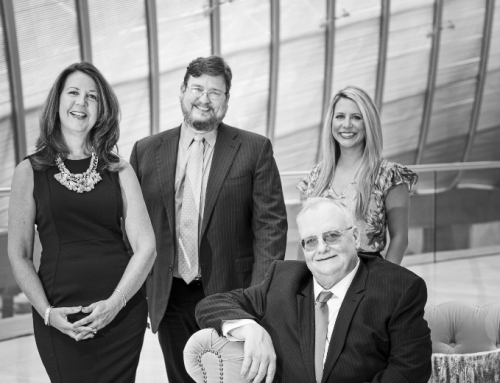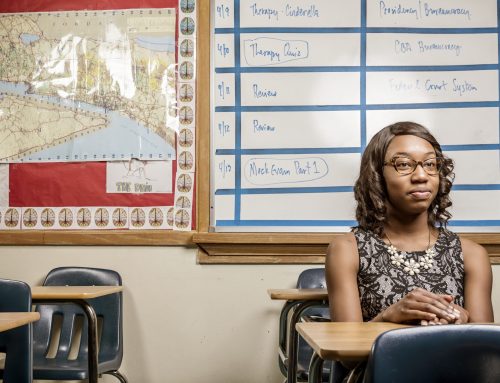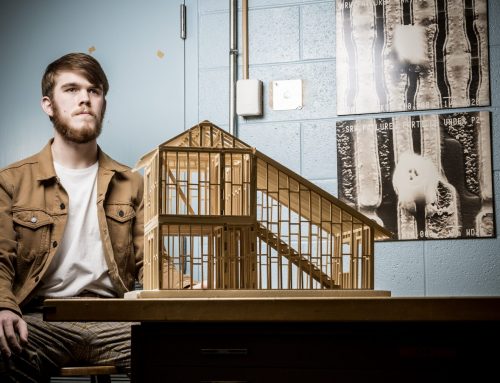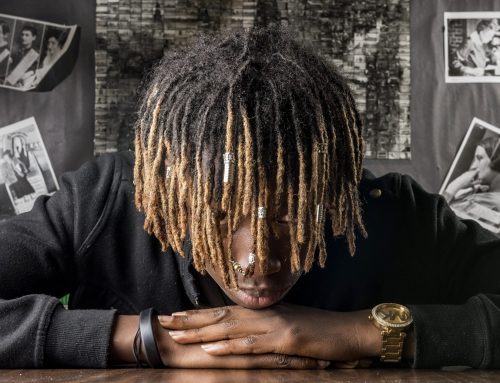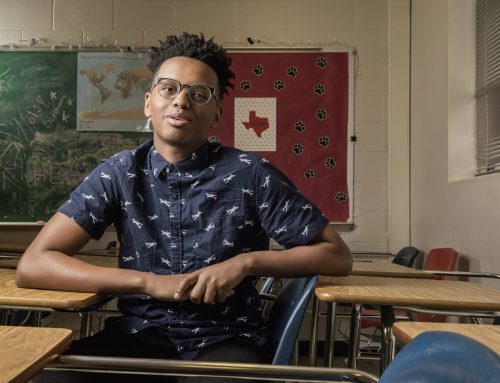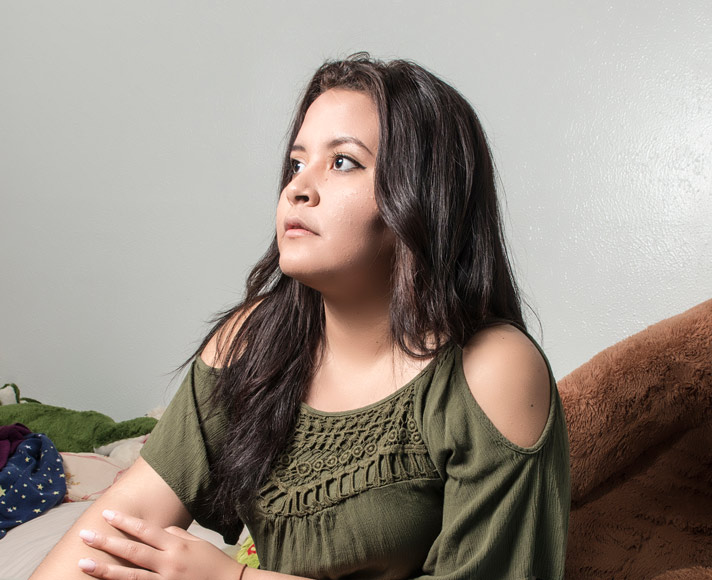
Class of 2016 Carla Ruiz, Photo by Danny Fulgencio
A full life
Five years ago, while living with her family in El Salvador, Karla Ruiz awakened to a nightmare. Her father could not be dead, she thought, despite what her weeping mother was telling her. They were supposed to watch the baseball game on TV, a favorite father-daughter pastime, and he had been late. She waited, and when the game ended she went to bed. Later that night, she swears, her dad cracked her bedroom door and whispered, “Lo siento. Buenas noches, te amo.” She accepted his apology and said she loved him too before drifting back to sleep. “It was weird,” she says. “I still think I remember him coming in and saying goodnight and that he was sorry for being late.”
In reality, her father was killed on impact in a car accident on his way home from work.
Losing a parent is one of the greatest sorrows a young person can face, and for Karla it went beyond grief.
She lived in an area controlled by gangs, she says.
After he was gone, she realized that her dad had been protecting the family from danger.
Paying off gangs to leave you alone or to shield you from harm was a way of life where she came from, Karla explains. It was something that her mother could not handle alone.
“After he was gone, all of the sudden, there were days when we couldn’t go to school, when my mom would say it wasn’t safe to leave the house.”
Adding to the stress, insurance did not pay enough on the accident to keep the family financially afloat. Karla’s mom worked tirelessly but couldn’t sustain. So she sent Karla to live in California with cousins she had never met.
In San Francisco Karla enjoyed relative safety, a good education and comforts such as her own bedroom. It took the bright teenager less than a year to learn English. She had one especially good teacher, Mrs. Ramirez, she says, but still her heart was breaking. She remembers the anniversary of her dad’s death, sitting in a room alone, grieving.
“That was a turning point where I told my mom I could not live without her. If she did not come to the United States, I was going back to El Salvador.”
Meanwhile, her mom had sought asylum and, not long after Karla’s ultimatum, she resettled in Texas where she rented a two-bedroom apartment in Lake Highlands. It was crowded — Karla’s older brother and his wife and baby lived in one room while Karla’s mother and sister occupied the other.
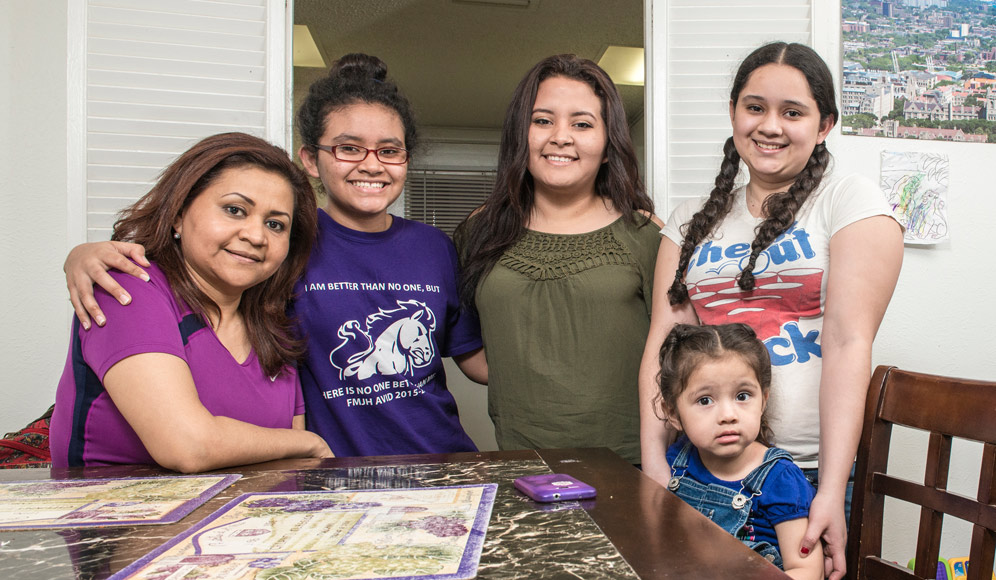
Karla Ruiz, Class of 2016. Photo by Danny Fulgencio
“My mom always tells me I had it better in San Francisco, but all I wanted was her.”
Karla happily shares a room now with her sister and mother. “It’s fun, actually,” she says.
The space looks a little like a college dorm room — three twin beds line the wall, two overrun with stuffed animals. A tattered Eeyore doll is the last gift Karla’s father gave her, she says, and hugs it tight. “I don’t want to wash it. I think I can still smell his cologne. My mom says I can’t, but I think it is still in there.”
Photos and notes from the special education students Karla tutors are pinned above her pillow.
In mostly Advanced Placement classes she is making all A’s, says her counselor, who made Karla exchange one AP class for its standard version because she was working more than 40 hours a week.
Karla gives half of her earnings from serving at the Olive Garden to her mom for rent. She gives an allowance to her younger sister, and she recently emptied out her savings account to help her brother when he encountered serious financial trouble. “It’s OK,” she insists, “because I have my brother.”
Ostensibly their apartment isn’t much — outside, brown paint is peeling and stray dogs have the run of the parking lot. The crime rate is high — when Karla parks at the far reaches of the complex late nights after her shift, she sprints from the car to front door.
“I have never had any crime happen against me,” she says. “But I know it happens. We had a neighbor who just got robbed.”
But warmth permeates the inside of the tidy, colorful, welcoming flat. On a weekday afternoon in spring, mom is cooking in the kitchen and spicy aromas waft across the living room where the TV is set to a Spanish game show. Framed family photos occupy shelves and walls, and pink playthings stand in neat piles (that is until Karla’s 2-year-old niece barrels in and attacks them). Karla’s textbooks, folders and papers form towering kitchen-table skyscrapers. With precision, she has inked important dates onto a handmade wall calendar — Nov. 5 is the anniversary of her dad’s death. June 5 is graduation day.
She was accepted to all eight colleges for which she applied. She credits the AVID program and exceptional instructors including her chemistry teacher, Steve Kim and AVID teachers like Pam Gayden. “I never expected I would ever get into college, go to college, get scholarships, and all of this happened thanks to them.”
Despite her demonstrated drive and talent, Karla is humble, her guidance counselor Donna Lambeth says. “She had to retake an easy algebra class because of some transfer technicality, and she finished in record time with no complaints. Then she makes great greades in super-hard classes.”
Karla plans to double major in psychology and special education at University of North Texas in Denton. There is an Olive Garden near campus, she says. She will transfer, continue waiting tables and paying a share of her family’s household expenses.
Gratitude seems to be the magic that propels this young woman.
She misses her father terribly, she says, but is grateful for the path on which the tragedy put her. And she has what she wants most — “My family, all together. As long as we are together, I can deal with anything else.”

